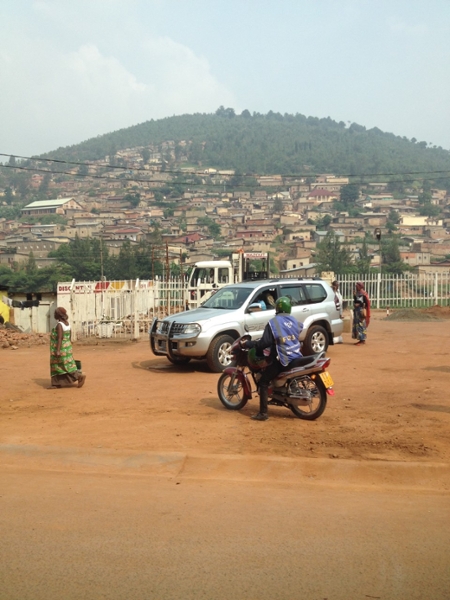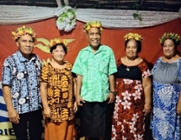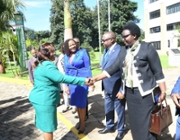Promoting economic growth in East Africa

24 August 2021
CLGF joined forces last week with partners in East Africa to hold an important two-day event, entitled: Dialogue on Local Economic Development for promoting EAC regional trade and economic growth.
Organised by the EALGF (East Africa Local Government Forum), the EALGA (East Africa Local Government Association) and co-hosted by CLGF; the event featured a number of high level speakers and provided a crucial opportunity for CLGF members to discuss the role of local government in the region, particularly relating to trade, locally and regionally.
Interconnectivity
Opening the event, remarks were given by one of the key organisers - Secretary-General, EALGA/Co-ordinator for EALGF, Ms. Gertrude Rose Gamwera, and CLGF’s Acting Secretary-General, Ms Lucy Slack. They both stressed the challenges for local government on the frontline of dealing with Covid-19 and how the pandemic had emphasised the importance of the sector and the need for more interconnectivity. An incident in a small municipality in Uganda can have an effect in Kenya, which is why discussions on local integration and working more closely with the EAC are so important.
Regional economic blocs
Dr. Kevit Desai, Principal Secretary, Ministry of East African Community Affairs, Kenya and Chair, EAC Ministers Coordinating Committee gave an introduction to the EAC Trade and Regional Agenda and related policy framework. He explained that globalisation has caused countries to be interdependent and they are forming economic integration blocs, or signing bilateral agreements, to widen and deepen co-operation in socio-political, security and economic integration to fast track development and to collectively face the challenges of globalisation. The regional economic blocs strengthen the position of member countries on the global, political landscape and bargaining power on international issues. The treaty for the establishment of the East African Community (EAC) recognises that the practical achievement of the objective of the community is premised on the principle that the EAC is people-centered and market driven.
Fastest growing economic region
Dr Desai described how the EAC is one of the fastest growing Regional Economic Communities (REC) in the world. The geo-strategic location of EAC gives it an advantage as the gateway to the hinterland and hub of the African trade. The Community is home to around 186.9 million citizens with a total area of 2.5 million sq km and a combined GDP of US$228.1 billion. Before, the COVID-19 pandemic, EAC region exhibited the potential to promote economic growth and reduce poverty through increased exports of domestic good but emergence of COVID-19 pandemic affected EAC region and its Partner States. It deeply shocked most economic activities, especially trade and investment.
Dr Desai described how the EAC's regional Laws have been reviewed to promote trade and value industrialisation in the region, including:
- a comprehensive review of the EAC Common External Tariff (CET) - Partner States have adopted a four-band structure and EAC Customs Management Act (CMA), 2004; and
- the implementation of the Single Custom Territory (SCT), facilitation of One Stop Border Posts and improvement of regional transport corridors, reducing the cost of doing business and the time taken to move cargo from the point of entry to the destination.
Local economic development driving trade
Mr Vijay Krishnarayan introduced his paper, commissioned by CLGF, on Local Economic Development as a Driver of Trade in the Commonwealth. CLGF has established a substantive body of work on Local Economic Development (LED) over the past 10 year, framed by the Aberdeen Agenda and informed by practice and learning generated by members through regional and programme offices.
The starting point for CLGF is that LED is a characteristic of developmental local government. It highlights the importance of enabling institutions (central, local, state and non-state). Local government’s role goes beyond statutory obligations and extends to strengthening capacity and fostering coherence. In particular, Mr Krishnarayan highlighted:
- the importance of policy coherence and better institutional linkages between local and national;
- the need to ensure that LED strategies open up value chains for local stakeholders to benefit from international trade agreements;
- the need for support to micro, medium and small sized enterprises (MSMEs) to achieve national development priorities;
- the role of cities as catalysts for LED and trade; and
- the relevance of LED in localising the delivery of Agenda 2030 and post-COVID economic recovery.
LED in Rwanda
Mr Ladislas Ngendahimana, Secretary-General of RALGA (Rwanda Association of Local Government) described how LED is a process used by local government and communities to manage their existing resources to boost the local economy through the creation of new jobs, and to stimulate local economic activities in a well-defined economic zone. He said that LED involves the public, business and other partners. It requires combined efforts. Stakeholders work collectively to create better conditions for economic growth and employment creation. The main priority areas of the National LED Strategy (2018-2024) include:
- promoting the development of value chains, based on local potential and comparative advantages through enhancing the local business investment climate;
- investing in infrastructures and capacity development for entrepreneurship and employment; and
- enhancing the capacity of local entities to deliver on LED through Promoting community participation in generating inclusive solutions to support LED.
Southern Africa experience
CLGF's Regional Programme Manager for Southern Africa, Nyasha Simbanegavi, provided insights from her region. A regional LED programme has been implemented since 2012 in two phases: a pilot from 2012 to 2016, involving 16 councils in Botswana, Eswatini, Zambia and Zimbabwe and supporting partners in South Africa to roll out the Small Towns Regeneration Initiative in four more councils. Phase two (2017-2021), worked with around 50 councils on the roll-out of LED, again in Botswana, Eswatini, Zambia and Zimbabwe. CLGF also supported partners in South Africa to promote the Regional Approach to LED under the country’s new District Development Model.
Ms Simbanegavi decribed the main activities of the first phase:
- capacity building of elected and appointed officials in the planning and implementing of LED through training and mentorship;
- setting up LED units/ focal points in 16 councils in the four countries;
- establishing local multi-stakeholder platforms to allow for stakeholder participation in LED planning and implementation, such as LED Forums and committees;
- Local Economic Assessments in the target local authorities to identify strengths, weaknesses, opportunities and threats within the local economy; including surveys on stakeholder satisfaction with council services;
- creation of LED strategies to address weaknesses and maximise existing opportunities within the economies;
- support for the development and implementation of national LED frameworks and guidelines as follows (LED Framework in South Africa; LED Framework and Decentralisation Policy in Botswana; LED Guidelines in Eswatini and Zambia; and Private Public Partnership Guidelines for local authorities in Eswatini); and
- support for pilot local authorities to implement selected projects contained in their LED Strategies.
Regional Technical Advisor for UNCDF, Mr Dmitry Phozidhev, talked about leveraging the Development Fiscal Space for effective sub-national and local government service delivery, Regional Development and the SDG Global Agenda.
Ms Gamera gave a presentation on the current EALGF structure and a proposal for strengthening its mandate for effective collaboration. Other speakers included: Morris Tayebwa, Chairperson of the EAC Sectoral Committee on Trade; Mr. Samuel Dusenginyumva, Permanent Secretary, Chair Technical Committee EALGF, Mr Anthony Namara, Commissioner LED, Ministry of Local Government, Uganda TANZANIA – Ministry of Regional and Local Administration; the Kenya County Assemblies Forum and Connective Cities.
Pleased with the outcomes of the meeting, one of the key organisers, Ms. Gertrude Rose Gamwera said: "The first meeting of its kind for a few years, this has been very important, not only in being able to raise awareness of the important role that local government has to play in LED, international trade and Covid recovery, but also of how important an invaluable regional collaboration is."
Back to News





